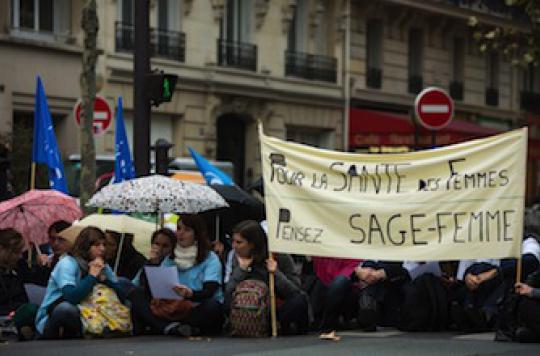The midwives who claim access to the status of hospital practitioner emerged disappointed from their interview at the Ministry of Health. The strike continues and is already disrupting maternity hospitals.

“More than 50% of French maternity hospitals have gone on strike, which is a very good sign for the first day of mobilization. And midwives still continue to declare themselves on strike today. This is the positive assessment of Caroline Raquin, president of the National Organization of Midwifery Unions (ONSSF), the day after the first major day of midwifery mobilization across France. These health professionals are demanding recognition in particular, by finally gaining the status of hospital practitioner, they who are for the moment still considered to be paramedical professions. But on the side of political fallout, the account is still not there according to them. They thus announced in a press release published on Thursday, to commit to continuing the “sit-in” in front of the ministry, but also their strike, that as long as the discussions with the profession do not succeed.
Midwives forgotten in discussions on the health law
A delegation of midwifery organizations was however received Wednesday by representatives of Marisol Touraine, after the organization of the sit-in in front of the premises of the Ministry of Health. As desired by the organizations, the discussion focused on the positioning of midwives as a primary care practitioner and on the status of hospital practitioner.
On the first point, the ministry proposed the establishment of a joint mission of the General Inspectorate of Social Affairs (Igas) and the General Inspectorate of National Education and Research Affairs (IGAENR), which will have to submit its report in the first quarter of 2014, in order to judge the relevance of this positioning, indicates the ONSFF.
The Organization adds that the ministry is committed to involving midwives in debates on the health law promised for 2014, by organizing a workshop on perinatal care. Conclusion for midwives, until yesterday they were not included in the upcoming debates on perinatal organization, on the side of the ministry. Caroline Raquin confides her disappointment at the end of this meeting with the ministry, of which she keeps a bitter memory to say the least.
Listen to Caroline Raquin, president of ONSFF: ” The ministry had not thought of including midwives in discussions on the health law. It is a real contempt on the part of the minister. Coming out of this meeting, we were all stunned …“
The strike movement is already disrupting maternity hospitals
With 90% of the midwives on strike at the Kremlin-Bicêtre hospital (94) or even 100% at the Louis-Mourier hospital in Colombes, where Caroline Raquin works, no need to say that this strike is extremely well followed by midwives. And this movement is already seriously disrupting the functioning of maternity hospitals. On strike, as is the case in some maternity hospitals, midwives are assigned to a minimum emergency service. In these establishments, midwives are now only present in the delivery room, and that’s it. In all the other services, consultations, pathological pregnancies, after-births, there is no longer any of these professionals available.
Listen to Caroline Raquin, President of the ONSFF: ” The doctors and interns will have to manage to do our job. It will be very complicated for them … “
A fight also for pregnant women
Obtaining the status of hospital practitioner would admittedly be recognition for these midwives, who in practice, during uncomplicated pregnancies, perform all the acts that specialist hospital doctors do (ultrasound, preparation for childbirth, monitoring, etc. .).
But their fight is also with the aim of offering the best possible care to women in maternity hospitals, underlines Caroline Raquin. By managing the services themselves, midwives believe that they will be able to offer the best possible pregnancy follow-up and the ideal childbirth adapted to each woman. An ideal, as we have understood, far removed from the famous baby factories often denounced today by many midwives.
Finally, the president of the ONSFF confirms that a pregnancy follow-up by a midwife will ensure the pregnant woman at a lower cost. Because, these professionals are less expensive than doctors. “The most modest households could thus save money,” says Caroline Raquin. “For all these reasons, the movement is now very well accepted by patients who encourage us to continue our fight “, she concludes.
Listen to Caroline Raquin, President of the ONSFF: ” We warn patients of disturbances in maternity wards. We also do this for them, because we want them to have appropriate care for their pregnancy. This is why the movement is very well accepted…“
.

















